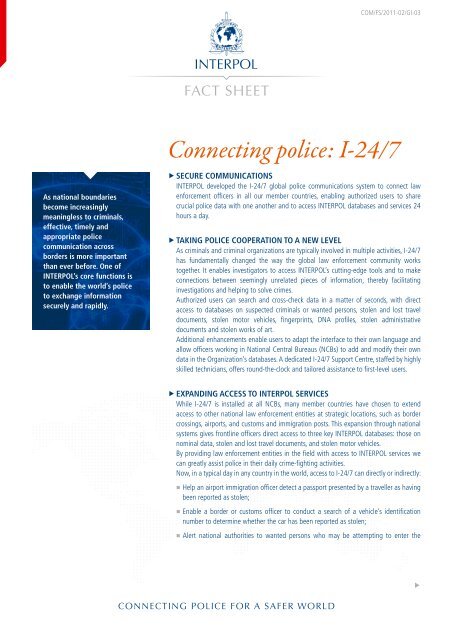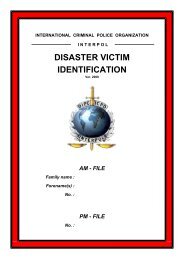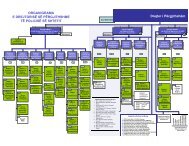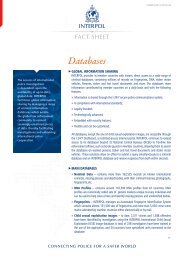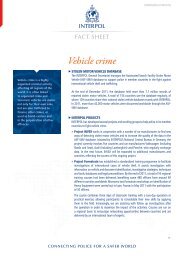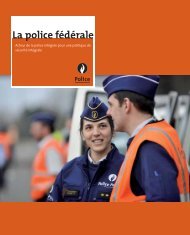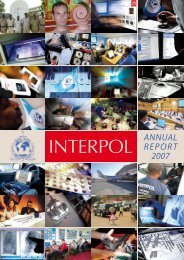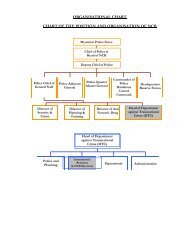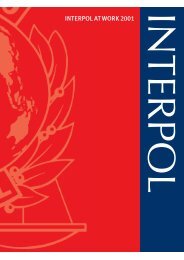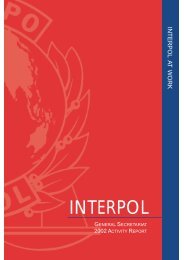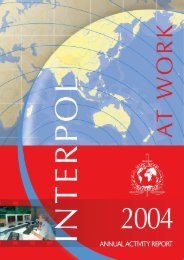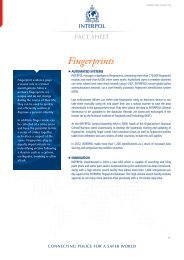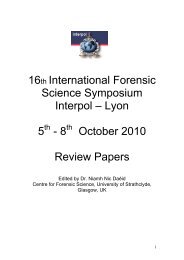Connecting police: I-24/7 - Interpol
Connecting police: I-24/7 - Interpol
Connecting police: I-24/7 - Interpol
Create successful ePaper yourself
Turn your PDF publications into a flip-book with our unique Google optimized e-Paper software.
As national boundaries<br />
become increasingly<br />
meaningless to criminals,<br />
effective, timely and<br />
appropriate <strong>police</strong><br />
communication across<br />
borders is more important<br />
than ever before. One of<br />
INTERPOL’s core functions is<br />
to enable the world’s <strong>police</strong><br />
to exchange information<br />
securely and rapidly.<br />
FACT SHEET<br />
CONNECTING POLICE FOR A SAFER WORLD<br />
COM/FS/2011-02/GI-03<br />
<strong>Connecting</strong> <strong>police</strong>: I-<strong>24</strong>/7<br />
� SECURE COMMUNICATIONS<br />
INTERPOL developed the I-<strong>24</strong>/7 global <strong>police</strong> communications system to connect law<br />
enforcement officers in all our member countries, enabling authorized users to share<br />
crucial <strong>police</strong> data with one another and to access INTERPOL databases and services <strong>24</strong><br />
hours a day.<br />
� TAKING POLICE COOPERATION TO A NEW LEVEL<br />
As criminals and criminal organizations are typically involved in multiple activities, I-<strong>24</strong>/7<br />
has fundamentally changed the way the global law enforcement community works<br />
together. It enables investigators to access INTERPOL’s cutting-edge tools and to make<br />
connections between seemingly unrelated pieces of information, thereby facilitating<br />
investigations and helping to solve crimes.<br />
Authorized users can search and cross-check data in a matter of seconds, with direct<br />
access to databases on suspected criminals or wanted persons, stolen and lost travel<br />
documents, stolen motor vehicles, fingerprints, DNA profiles, stolen administrative<br />
documents and stolen works of art.<br />
Additional enhancements enable users to adapt the interface to their own language and<br />
allow officers working in National Central Bureaus (NCBs) to add and modify their own<br />
data in the Organization’s databases. A dedicated I-<strong>24</strong>/7 Support Centre, staffed by highly<br />
skilled technicians, offers round-the-clock and tailored assistance to first-level users.<br />
� EXPANDING ACCESS TO INTERPOL SERVICES<br />
While I-<strong>24</strong>/7 is installed at all NCBs, many member countries have chosen to extend<br />
access to other national law enforcement entities at strategic locations, such as border<br />
crossings, airports, and customs and immigration posts. This expansion through national<br />
systems gives frontline officers direct access to three key INTERPOL databases: those on<br />
nominal data, stolen and lost travel documents, and stolen motor vehicles.<br />
By providing law enforcement entities in the field with access to INTERPOL services we<br />
can greatly assist <strong>police</strong> in their daily crime-fighting activities.<br />
Now, in a typical day in any country in the world, access to I-<strong>24</strong>/7 can directly or indirectly:<br />
■ Help an airport immigration officer detect a passport presented by a traveller as having<br />
been reported as stolen;<br />
■ Enable a border or customs officer to conduct a search of a vehicle’s identification<br />
number to determine whether the car has been reported as stolen;<br />
■ Alert national authorities to wanted persons who may be attempting to enter the<br />
�
� CONTACT INFORMATION:<br />
Contact us via our web site. For matters<br />
relating to specific crime cases, please<br />
contact your local <strong>police</strong> or the INTERPOL<br />
National Central Bureau in your country.<br />
� Twitter: @INTERPOL_ICPO<br />
� YouTube: INTERPOLHQ<br />
� WWW.INTERPOL.INT<br />
I-<strong>24</strong>/7 fact sheet<br />
country by air or sea.<br />
� INTERPOL SERVICES IN ACTION<br />
By running automatic checks on INTERPOL’s databases via a remote connection to I-<strong>24</strong>/7,<br />
officers at Tivat airport in Montenegro were able to identify and apprehend a dangerous<br />
criminal. The routine check against INTERPOL’s database of stolen and lost travel documents<br />
showed the passenger was travelling on an invalid document. Further checks revealed the<br />
individual’s true identity as well as the fact that he was subject of a red notice issued by the<br />
NCB in Moscow, wanted for serious crimes including murder, and considered the leader of<br />
a criminal group. Apprehended in October 2009, the individual was extradited to Russia in<br />
May 2010.


